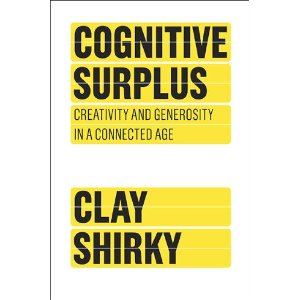
One of the many things I like about Clay Shirky's new book, "Cognitive Surplus: Creativity and Generosity in a Connected Age," is that he shines a light on some of the human qualities that give the Internet its real value. Shirky writes, "The harnessing of our cognitive surplus allows people to behave in increasingly generous, public and social ways, relative to their old status as consumers and couch potatoes." (p. 63) Generosity is intrinsic to the overall success of social networks, yet its role in your network presence plan may not be clear.
Generosity can mean giving things away for free, and that is a standard formula for business websites: give people free access to some content, and charge for more. (Or in my case, give away content and charge for services.) Businesses that value generosity often make it a practice to help support a local non-profit agency, in order to give back to the community. Yet generosity in social networks is different than just wealth or resources, and understanding the difference could make or break your network presence plan.
Shirky's point is that people are naturally generous with their time and energy, and that successful social networks find a way to harness this. Consider the wealth of links shared on Facebook, or the articles people write for Wikipedia. Reciprocated generosity builds good will and keeps people engaged in online conversations. That is why the prime directive of social media marketing is to keep conversations going -- respond when they post comments on your blog, tweet them back when they ask a question, answer their emails when they write to you.
Yet none of this public sharing will do much good if it doesn't also have a generous tone. If you want to increase your professional presence and visibility, remember that expertise alone will not do the trick -- you must observe the principles of generosity by thanking those who write you, genuinely considering their ideas and responding with respect.
If all this makes you wish for a root canal instead, consider the grand paradox of generosity: It demands boundaries, an understanding of how much you can give, and for how long, before running dry. If you keep reflexively giving even when you have no more to give, you are not really being generous -- you are waiting for someone to rescue you.
That's why my first advice to clients is to find good examples of people who are managing to be generous on terms that work for them. If you are clear and authentic about what you can and cannot do, people will learn that you are consistent and therefore reliable, and your contributions will have more value, not less.
The hardest thing for over-stretched people to accept is that the benefits of generosity do not stop when they have to put down the writing, or podcasting, or volunteering for a while. If you have your intention and energy focused on a goal (a great marketing plan, for instance) that has generosity built in, you are set. Keep showing up, know your limits, trust your goals, and show a little bit of grace along the way -- and don't act surprised when it all goes according to plan.
This article was originally published at Creative Content Coaching.